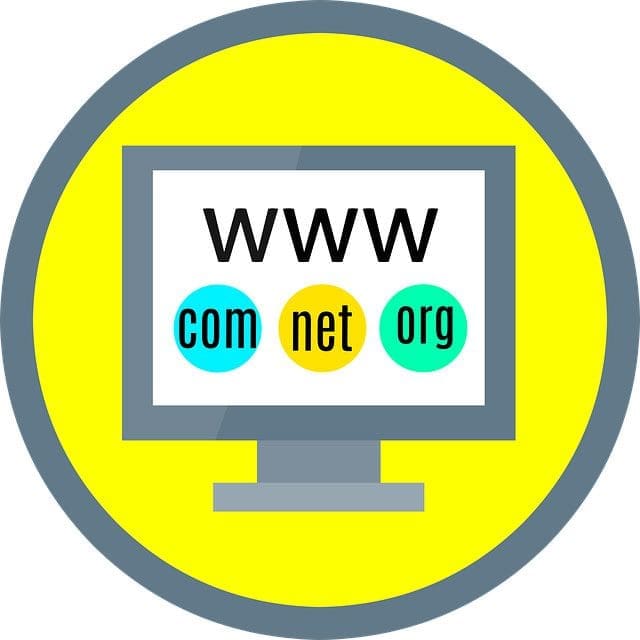The domain name is the easy to remember address of your website. It is the address that customers will put into their web browser (i.e. Google) to visit your website.
There are different parts to a domain name which we’ll come to later.
Each domain name is connected to a unique yet complex IP address, yet the domain name is an easier way for us humans to find a website. A domain name is sometimes referred to as a URL (Uniform Resource Location) or website address.

What is an IP Address?
Each website has a unique IP (Internet Protocol) address consisting of a set of numbers. These numbers form the language by which computers talk to one another over the web.
No-one is expected to remember thousands of numbers (the IP addresses). Instead, the domain name and it different parts are the point of contact on the world wide web.
What are the different parts of a domain name?
There are three different parts to a domain name.
The domain name (bloomdigitalmarketing.uk) the main name of the company; the top-level domain is the suffix on the end (.co; .com; .org).
The second level domain is a country (.uk or .co.uk).
There is also the subdomain which can be a prefix the adds another layer of classification to a domain. These all begin with www. which stands for world wide web although we no longer need to type www into the browser anymore.
Do I need a domain name to have a website?
Yes!
And while you could be forgiven for thinking they’re the same thing, a website and a domain are actually different entities, although they are closely connected.
You’ll need to register a domain and hope that no-one else has thought of it, or search for one that you think might be the best for your business.
There are various ways of doing this and we’d always recommend registering your domain yourself and owning the domain in your own right.
When you register your domain then you get a web address or addresses www.bloomdigitalmarketing.uk
Some businesses create and register domains but don’t have a website for them. For example we have the dot.com and co.uk version for Bloom Digital Marketing but only use .uk for our website. This is to protect the business name.
You can’t have a website without using a domain. If you purchase a domain name, you can use this for one year or more and then you renew it. Domain registrars will remind you when the renewal is due. If you let it expire this will take down your website.
How Does a Domain Name Actually Work?
If you enter a domain name into the search bar of your web browser, your computer or phone will send a request to a worldwide network of servers the make up the Domain Name System. These servers then look up the relevant server that hosts your website, usually your hosting company. Your hosting company will forward your request to the computer on which your website is stored, which then sends this data back to the customer or your browser. Of course, all this happens (or it should happen) in lightning-fast time!
Can I Change My Website but Keep My domain?
Yes, you can.
You can also move your website to a different domain name, maybe if change your business name or the co.uk became available. But be careful as a change in domain name will impact any search engine optimisation work and the change needs to be managed to minimise this.
Can I change my webhosting company?
Yes … although this can depend on who owns the domain as you will need to change the DNS records. You will need your domain registrar login details.
Is a Domain Name Different to a Website and Web Hosting?
Yes. A website is made up of many files, images and more and all websites need a server in order for it to be visible. This is your website hosting provider.
Once you’ve got web hosting, you will need to update your domain name settings and point it to your web hosting service provider.
Sometimes you can buy a domain name and have it hosted with the same company. This does have advantages and disadvantages. We actually host our sites with a different company to our domain registrar.
Read our blog about website hosting.
Why are some domains so expensive?
You can pay millions of pounds for a domain name if there is hot competition for a particular one. Some companies specialise in selling and re-selling domains and intuitive entrepreneurs sometimes purchase a domain and use it or sell it at a later date when the market conditions are just right. Most domains, however, are affordable and can be as little as £15 a year or less. It depends
What are The Rules About Domains?
You can only use letters, numbers and hyphens (but not a double hyphen or a hyphen at the beginning).
They’re not case sensitive and they must contain between 2 and 63 characters before any punctuation.
The Domain Name System is managed by ICANN (Internet Corporation for Assigned Names and Numbers). This gives the Domain Name Registrars permission to sell domain names. The Domain Name Registrars can sell domain names, manage records, transfers and renewals.
I’ve Got a Great Idea for a Domain Name …
This is great news!
There is a mind-boggling number of domain names already in existence, with new ones being added all the time.
There are some helpful tips:
Keep it simple and short.
If you are a UK business then use a dot.co.uk domain if possible and register the other variations to protect your company name further. If you are targeting an international audience then use the dot.com. Google recognises the uk versions and then knows tha is your target audience as opposed to a global audience.
If you get stuck there you can use a domain name generator for ideas.
And don’t forget you also need a web hosting service once you’ve bought your domain!
We can help with domain names, webhosting and developing and designing your website for you. We include domain advice and website hosting in all of our projects.





